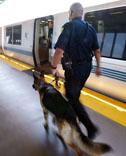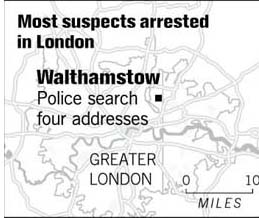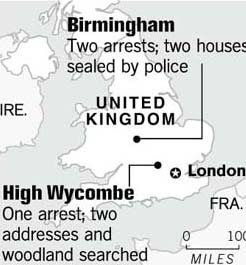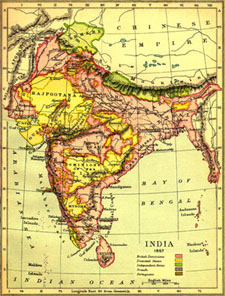UK-US airline terror threat.. are the Brits really wiser in these foolish things?
Aug 16th, 2006 | By Counterweights Editors | Category: USA Today The foiled British terror threat that put places as far away as northern California “ON ALERT” last week is bound to remind Canadians of their own foiled terror threat only two months back. Yet last summer “Islamist” terrorists of some sort actually did bomb the London transit system. And that, among other things, gives the current British incident more traction. Even so, the Canadian Press has already reported: “British officials downgrade threat level, a relief for weary travelers.” And again there seems some time to wonder just what is really going on in the strange brave new world of international Islamist terrorism 2006.
The foiled British terror threat that put places as far away as northern California “ON ALERT” last week is bound to remind Canadians of their own foiled terror threat only two months back. Yet last summer “Islamist” terrorists of some sort actually did bomb the London transit system. And that, among other things, gives the current British incident more traction. Even so, the Canadian Press has already reported: “British officials downgrade threat level, a relief for weary travelers.” And again there seems some time to wonder just what is really going on in the strange brave new world of international Islamist terrorism 2006.
Reasonable and unreasonable fears …
 The apparent bottom line here is that “more than two dozen people” were arrested in England and Pakistan, in “what officials say was a plot to blow up as many as 10 passenger planes between Britain and the United States.” This led to heightened security arrangements at both British and US airports.
The apparent bottom line here is that “more than two dozen people” were arrested in England and Pakistan, in “what officials say was a plot to blow up as many as 10 passenger planes between Britain and the United States.” This led to heightened security arrangements at both British and US airports.
As in the foiled Canadian case two months ago, just what the hard facts are is not easy to say, judging from published reports in the mass media. Today, Tuesday 15 August, the British police have apparently detained another suspect. But according to yesterday’s Canadian Press report: “Information about the terror plan was in short supply Monday [14 August]. The [UK] government has yet to name all of the suspects or said where they are being held, and has not briefed reporters on their investigation since Thursday [10 August].” And the essential thrust of this message seems not to have changed over the past 24 hours or more.
UK Home Secretary John Reid has cautioned that the recent “easing of security measures and the lowering of the terror threat level did not mean that Britain was out of danger … There is still a very serious threat of an attack. The threat level is at severe, indicating the high likelihood of an attempted terrorist attack at some stage, and I urge the public to remain vigilant.'”
On the other hand, British “Prime Minister Tony Blair has remained on vacation in Barbados throughout the ordeal, allowing himself to be photographed in a floral bathing suit, an image that provided welcome fodder for political satirists … Deputy Prime Minister John Prescott, who is running Britain in Blair’s absence, has made only the briefest of appearances on television.”
 Ever since September 11, 2001 security services in all of such places as the US, UK, Canada, Australia, and so forth have been receiving extra public funds and attention. Who knows? They may feel obliged to report foiled terrorist plots that never reach fruition – and may have never actually happened in any case (who can really say?) – just to show that they are doing their job. Almost anyone who has been out in any modern labour force for any length of time can no doubt think of parallel cases in point from their own direct experience, and on and on and on.
Ever since September 11, 2001 security services in all of such places as the US, UK, Canada, Australia, and so forth have been receiving extra public funds and attention. Who knows? They may feel obliged to report foiled terrorist plots that never reach fruition – and may have never actually happened in any case (who can really say?) – just to show that they are doing their job. Almost anyone who has been out in any modern labour force for any length of time can no doubt think of parallel cases in point from their own direct experience, and on and on and on.
On the other hand again, the London transit system actually was bombed last year. And it certainly seems reasonable to worry about exactly what may or may not lie behind the reports of the foiled plot in the UK last week.
On Sunday 13 August, e.g., a banned mobile phone was suddenly heard ringing at the back of a Boeing 777 with 217 passengers and 13 crew, en route from Heathrow airport in London to New York. Despite advice from British Airways security that “it was safe for the plane to continue its journey, the captain turned back as a precautionary measure” – apparently after much “begging” from “terrified passengers” on board.
“The myth of airport security”
 You don’t have to think about all this too long, in the summer of 2006, before you start to suspect that it raises some appallingly and agonizingly deep problems. And a growing awareness of these problems increasingly belittles the ongoing efforts of the Bush administration in Washington to profit politically from the reasonable public fears they induce.
You don’t have to think about all this too long, in the summer of 2006, before you start to suspect that it raises some appallingly and agonizingly deep problems. And a growing awareness of these problems increasingly belittles the ongoing efforts of the Bush administration in Washington to profit politically from the reasonable public fears they induce.
Or so those on the true side of the angels are hoping. The next big test will of course come with this fall’s US mid-term elections – despite the alarming extent to which the cards are apparently already stacked against any dramatic defeat of any incumbents, on either side of the aisle.
There does happily enough seem a growing change of mood about the so-called war on terror in the USA today. (Some of the counterweights editors thought they could almost taste it, e.g., on a recent visit to both northern and southern California – a blue state no doubt, but also one that once elected Governor Ronald Reagan, along with the current Austro-American Governator.)
Yet the British media still seem to be doing a better job of getting at the appalling depth of the increasingly apparent problems that lie at the bottom of the changing mood. There seems very little in the US media today to match, e.g., Martin Samuel’s crisply cynical and world-weary (but also wise enough) August 15 piece on “The myth of airport security” in the Timesonline.
 As just a taste: “Welcome to the illusion of security, folks, as thousands of people who could not possibly be terrorists stand in the rain outside Heathrow, brainwashed into believing that what they are going through is necessary or particularly effective … We are so frightened of adopting measures that might offend the vocal Muslim community that we have managed to install a system that makes everybody a terrorist. And if everybody is a terrorist, then nobody is.”
As just a taste: “Welcome to the illusion of security, folks, as thousands of people who could not possibly be terrorists stand in the rain outside Heathrow, brainwashed into believing that what they are going through is necessary or particularly effective … We are so frightened of adopting measures that might offend the vocal Muslim community that we have managed to install a system that makes everybody a terrorist. And if everybody is a terrorist, then nobody is.”
It is doubtful that Mr. Samuel himself believes more effective measures of airport security – which single out, as he puts it, “those that by age, race, behaviour or appearance fit what is becoming not so much a profile as a clich” – are at all possible (to say nothing of desirable) in a properly free and democratic society. His main point is just that “airport security” in such a society will always be mostly a charade: “If someone is heading for the gate with the bomb-making equivalent of an Ikea flat-pack, someone in the dark arts department hasn’t been doing his job … The most efficient conqueror of terrorism – good intelligence married to good police work – remains the best hope of saving the day.”
Imperial echoes gone awry …
 And yet … It is arguable that the British have a better “dark arts department” than the Americans (and certainly than the Canadian and Australian juniors in the emerging new international security “anglosphere” – which at least ought to include such places as India and South Africa as well). The broadest argument seems to be that the British are just wiser in these matters, thanks to the lagging institutional memory of their only comparatively recently vanished role as masters of the greatest global empire since Rome, on which the sun never dared to set, etc, etc.
And yet … It is arguable that the British have a better “dark arts department” than the Americans (and certainly than the Canadian and Australian juniors in the emerging new international security “anglosphere” – which at least ought to include such places as India and South Africa as well). The broadest argument seems to be that the British are just wiser in these matters, thanks to the lagging institutional memory of their only comparatively recently vanished role as masters of the greatest global empire since Rome, on which the sun never dared to set, etc, etc.
At this juncture the link to Pakistan in the current British-US airplane terror threat becomes especially intriguing. As the Canadian Press report has explained, e.g.: “Pakistani authorities are holding 17 people – including a British citizen, Rashid Rauf, whom they said has al-Qaida connections and was a key player in the plot.
“At least one of Rauf’s brothers was arrested in Birmingham during a counterterrorism sweep there … The British High Commission in Islamabad said Monday it has not received confirmation that Pakistan is holding any British citizens, despite a written request for information. Aidan Liddle, a spokesman for the High Commission, said the two countries are co-operating in the terror investigation.”
Set this beside “The Time for the Shia” by Max Rodenbeck in the August 10 issue of the New York Review of Books. Mr. Rodendeck “writes on the Middle East for the Economist.” And at one point in his current NYRB article he aptly reminds us that Pakistan was “the first explicitly Islamic modern state.”
It was originally created by the British as they dismantled their empire in South Asia after the Second World War – at the persistent urging of the All India Muslim League founded in 1906, during the vibrant sunset of the old Raj in South Asia. (And “many prominent leaders” of this Muslim League “were in fact ” Shia Muslims – as in today’s Iran, Iraq, [parts of] Syria, and Hezbollah – “including its founding president, Muhammad Ali Jinah.”)
 And then recall that officially anglophone Pakistan today is both an ally of “the West” in the war on terror, and, it does seem clear enough (in its parts immediately adjacent to Afghanistan), a haven for Islamist terrorists of some consequence – including possibly even the ever elusive Osama bin Laden. And then the most appalling depths of the problem start to stir in your mind …
And then recall that officially anglophone Pakistan today is both an ally of “the West” in the war on terror, and, it does seem clear enough (in its parts immediately adjacent to Afghanistan), a haven for Islamist terrorists of some consequence – including possibly even the ever elusive Osama bin Laden. And then the most appalling depths of the problem start to stir in your mind …
You might even remember that the British, in their greatest moment of civil wisdom, dismantled their empire because just too many problems of this sort started to stir as long as a century ago (when, e.g., the All India Muslim League was born). And then you might finally start to think that part of the problem with the strange brave new world of international Islamist terrorism 2006 really is that both George W. Bush and Tony Blair just forgot this stark historical lesson from the more recent past, in the sudden mist of the vast new fears induced by September 11, 2001.
In any case, the main point here is just that there altogether has to be a better way ahead. It is not the truest highest and best destiny of the first great democratic Republic founded in the American Revolutionary War against the first British empire, 17761783, to finally (and so thoroughly ironically) take over Rudyard Kipling’s now terminally faded “White Man’s Burden” from the already dismantled second British empire, that gave birth to both the present-day democratic Republic of India and the subsequently more checkered Islamic Republic of Pakistan, in 1947.
A Prayer for November 7 … ?
 All of which could finally make you think that the next big step in resolving both the international war on terror and the ongoing conflict in the Middle East just could be the US mid-term elections, that will finally be held on Tuesday, November 7, 2006.
All of which could finally make you think that the next big step in resolving both the international war on terror and the ongoing conflict in the Middle East just could be the US mid-term elections, that will finally be held on Tuesday, November 7, 2006.
Which is of course not to argue that the Democrats know what they are doing on US foreign policy at the moment any more than the Republicans. But they at least might be considerably more open to seriously trying something new that works.
Part of the problem with the strange brave new world of international Islamist terrorism 2006 increasingly does seem to be that the current knee-jerk revival of the faded old empire in the early 21st century anglosphere is not working at all. (A point which of course also needs to be urged on the current new Conservative prime minister of Canada – and the old so-called Liberal prime minister of Australia too.)
 It is, as they say, just what the terrorists want us to do. We are right now just living up to their wild fantasy of a bizarre new Crusade, leading to some chimerical new feudal Caliphate in the harsh desert sky. We need to be doing something quite a lot different – and quite a lot smarter too – in both the Middle East and all the airports of the global village, at home and abroad, etc.
It is, as they say, just what the terrorists want us to do. We are right now just living up to their wild fantasy of a bizarre new Crusade, leading to some chimerical new feudal Caliphate in the harsh desert sky. We need to be doing something quite a lot different – and quite a lot smarter too – in both the Middle East and all the airports of the global village, at home and abroad, etc.
The Bush administration’s apparent new Lebanese entente with the USA’s fellow great late 18th century revolutionary Republic of France may suggest that even the current denizens of the White House can now see the moving finger’s writing on the wall.
Yet who seriously believes that they can finally turn themselves inside out enough to write with the moving finger even just cunningly (especially after listening to President Bush’s most recent pronouncements on TV)? It is time for the real Democracy in America to stand up, as tall as it can manage. The true side of the angels can only pray that something of this sort will at least somehow start on November 7, from sea to shining sea. The old anglophone age of empire – and its accompanying myth of overwhelming force – really has ended at last. The beleaguered Tom Delay may or may not understand Texas. But he clearly does not understand the rising new global village today.

